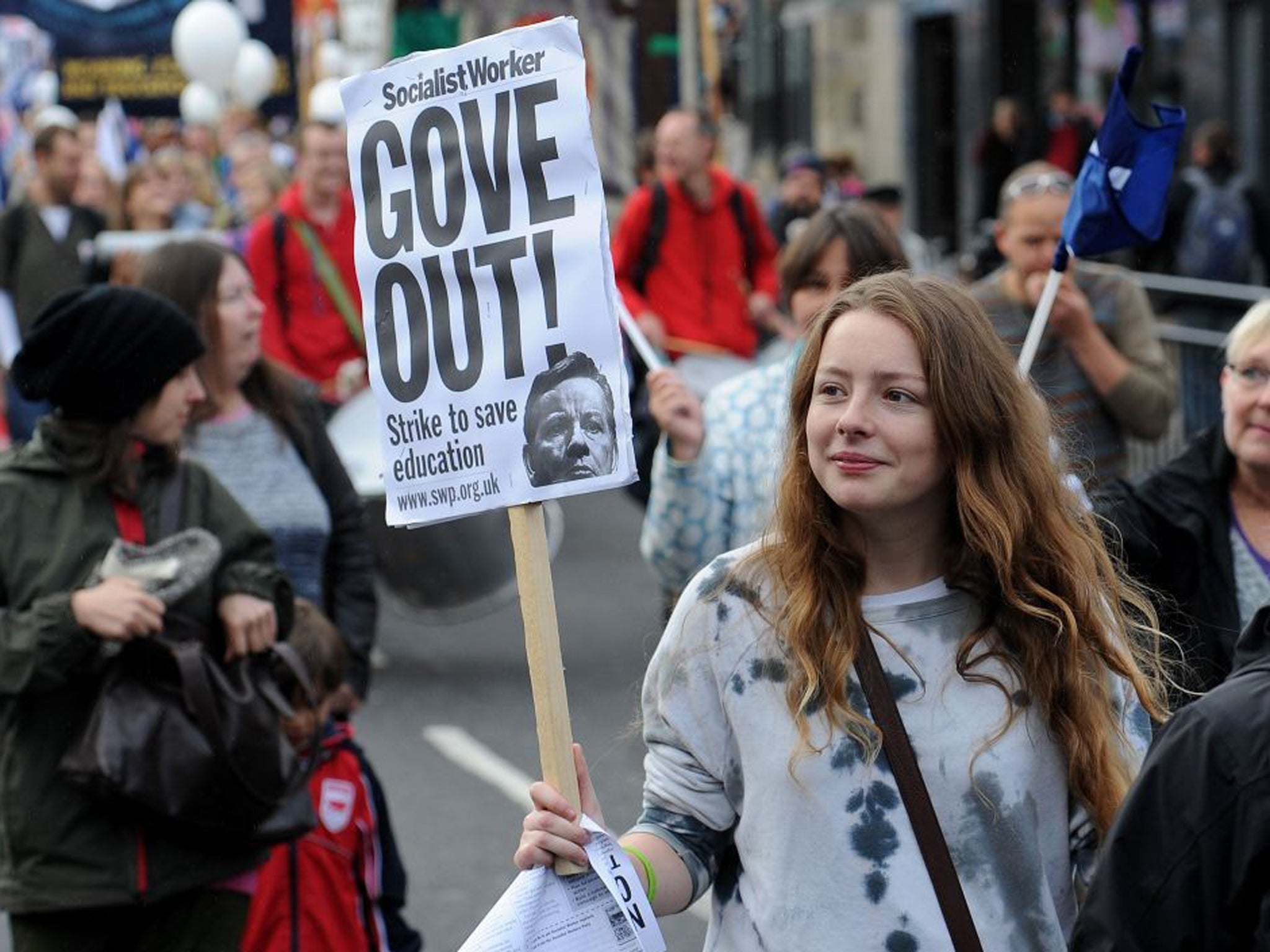A gloomy maths lesson: Parents face £1.2bn childcare bill over teachers' strike, says charity
Website's emergency childcare ads rose 77 per cent

Parents have had to fork out around £1.2 billion in extra childcare costs to deal with the hundreds of thousands of children affected by today's teachers' strike, according to research.
The Government claims the strike by members of the National Union of Teachers and National Association of Schoolmasters Union of Women Teachers, has closed more than one in four (27 per cent) of the estimated 10,000 schools affected, with the total number either closed or partially closed standing at 3,492. But Chris Keates, general secretary of the NASUWT teaching union said their figures suggested that around 82 per cent of schools had been affected in some way.
Members of the NASUWT, along with the National Union of Teachers (NUT), are staging walkouts in the North East and Cumbria, the South West, South East and London.
Speaking at a rally in Durham, Ms Keates said: "No teacher comes out with a spring in their step taking strike action.
"What we are seeing is a real air of determination to demonstrate that they are sick and tired of Education Secretary Michael Gove's denigration of the profession and the relentless attacks he has made on them, which they believe are attacks on children and young people."
Ms Keates estimated that around 2,000 people had taken part in the Durham rally alone, and said the strikes had "served their purpose".
According to Findababysitter. com - the online charity search site, the number of adverts seeking emergency childcare rose by 77 per cent this week as a result of the strike. It estimated the average cost of care to be around £100 - meaning an overall total cost of £1.2 billion.
Tom Harrow, chief executive officer of Findababysitter.com, said: "These parents are paying their taxes and therefore should expect to be able to go to work while their children go to school."
Officials at the Department for Education said support for the strike was lower than at the time of national strike action two years ago - when 60 per cent of schools in the affected areas closed.
The two unions have been holding a series of regional strikes - yesterday's affected schools in the north-east, south-east, south-west and London - and have threatened a national stoppage in protest against changes to their pay, conditions and pensions next month.
A Department for Education spokeswoman said: "The NUT and NASUWT have tried to create as much disruption for pupils and parents today as possible.
"In spite of this, thanks to many hard-working teachers and heads, only around a quarter of schools in the targeted regions were closed today.
"It is disappointing that the NUT and NASUWT are striking over the Government's measures to allow heads to pay good teachers more.
"In a recent poll, 61 per cent of respondents supported linking teachers' pay to performance and 70 per cent either opposed the strikes or believed that teachers should not be allowed to strike at all.
"All strikes do is disrupt parents' lives, hold back children's education and damage the reputation of the profession."
She insisted the government had met with the unions "frequently" to discuss their concerns, and that they would continue to do so.
Prime Minister David Cameron said responsibility for the walkouts lay with the unions and that he was "disappointed" they had decided to strike.
"It is very inconvenient for parents, it is not good for pupils' education," he told BBC Sussex radio.
"And when we look at the things they are striking over, pensions and pay, they are things that have been decided independently by well-led reviews."
The unions have said that the dispute focuses on three key issues - pay, pensions and conditions.
They are opposed to Government plans to allow schools to set teachers' salaries, linked to performance in the classroom, and argue that pensions changes will leave their members working longer, paying in more and receiving less when they retire.
They also accuse the Government of attacking their working conditions, including introducing reforms that will allow schools to have longer school days and longer terms.
The first regional walkout took place in the North West on 27 June, and further strikes took place in the East of England, the East Midlands, West Midlands and Yorkshire and Humberside on 1 October.
Plans for a national one-day walkout before Christmas have also been announced by the two unions.
Subscribe to Independent Premium to bookmark this article
Want to bookmark your favourite articles and stories to read or reference later? Start your Independent Premium subscription today.

Join our commenting forum
Join thought-provoking conversations, follow other Independent readers and see their replies